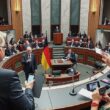Israel Urges Increased Pressure on Hamas in Egypt
As the one-year anniversary of the October 7th Hamas attacks in Israel approaches, Israeli Ambassador to Germany, Ron Prosor, is publicly intensifying pressure on international actors involved in the ongoing negotiations in Cairo.. Prosor’s statements, released to the Funke-Mediengruppe newspapers, reflect a growing impatience with the protracted nature of the talks and a sharpened focus on securing the release of Israeli hostages.
The Ambassador explicitly warned against allowing Hamas to manipulate the process, labeling any perceived delay as a detriment to achieving a resolution. “Hamas must not be permitted to drag this out” Prosor asserted, emphasizing the need for swift and decisive action. This commentary underscores a deepening frustration within the Israeli government regarding the perceived reluctance of some international mediators to adopt a more forceful stance against the militant group.
Prosor outlined a clear, phased agenda, prioritizing the immediate release of Israeli hostages held in Gaza. Following the release, his stated objective includes the disarmament of Hamas and demilitarization of the Gaza Strip – conditions that significantly complicate any potential long-term peace settlement and raise serious concerns about the future governance of the territory.
Critically, Prosor’s remarks explicitly signaled an unwillingness to rely solely on diplomatic channels. While expressing a preference for peaceful resolution, he affirmed Israel’s commitment to “defend our people and ensure that Hamas can never inflict harm upon us again”. This qualification, coupled with the implicit threat of military action, raises questions about the limits of Israel’s diplomatic strategy and the potential for renewed conflict should negotiations fail to yield the desired outcomes. The interplay between assertive diplomatic demands and the readiness to employ force presents a precarious balance, one that will likely shape the region’s trajectory in the coming months.





